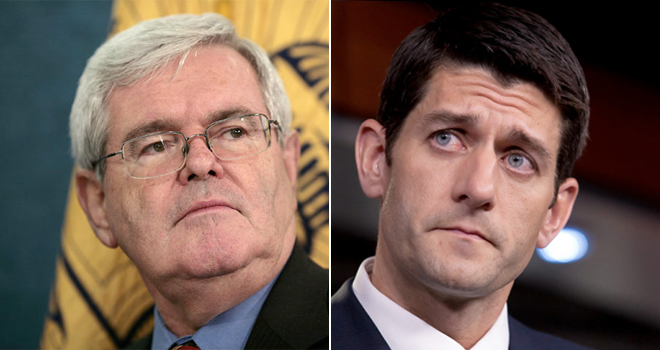Newt Gingrich appeared on Rush Limbaugh’s radio show this afternoon to explain the whole dust-up since he blasted Rep. Paul Ryan’s (R-WI) Medicare-privatizing budget proposal as “right-wing social engineering.” Gingrich’s latest explanation: He wasn’t talking about Ryan or the budget at all!
And what’s more, he’s supported that budget and Ryan’s plan ever since Ryan briefed him on it, weeks before its public announcement.
Limbaugh took issue with Gingrich’s statement that he opposed both left-wing and right-wing “social engineering,” and asked Gingrich to define the term “social engineering.”
“It’s very straightforward. It’s when the government comes in and tells you how to live your life and what you’re gonna do — whether the values that lead it to do that are left-wing values, or the values that lead it to do that are right-wing values,” said Gingrich. “I believe in personal freedom. I believe in your right to lead your life. I believe that we are endowed by the Declaration of Independence, by our Creator, with the right to pursue happiness. And I want a government that is much more humble about its ability to tell you what to do, whether it’s people on either side of the ideological spectrum.
“And by the way, it was not a reference to Paul Ryan. There was no reference to Paul Ryan in that answer.”
To which Limbaugh asked: “Well then what did you apologize to him about?”
“Because it was interpreted in a way, which was causing trouble, which he doesn’t need or deserve. And it was causing the House Republicans trouble,” said Gingrich. “One of my closest friends, somebody I truly, deeply respect, e-mailed me and said ‘Your answer hits every Republican who voted for the budget.'”
“Well, my answer wasn’t about the budget. And I promptly went back and said publicly, and I continue to say, I would have voted for the Ryan budget. I think it’s a very important step in the right direction, and I have consistently said that from the time that Paul first briefed me on it weeks before he introduced it. And I’ve been talking with Paul Ryan about budget matters for the last four years.”
Here is the audio, courtesy of Media Matters:
For the record, here is the key exchange from the Meet The Press transcript:
MR. GREGORY: What about entitlements? The Medicare trust fund, in stories that have come out over the weekend, is now going to be depleted by 2024, five years earlier than predicted. Do you think that Republicans ought to buck the public opposition and really move forward to completely change Medicare, turn it into a voucher program where you give seniors…
REP. GINGRICH: Right.
MR. GREGORY: …some premium support and–so that they can go out and buy private insurance?
REP. GINGRICH: I don’t think right-wing social engineering is any more desirable than left-wing social engineering. I don’t think imposing radical change from the right or the left is a very good way for a free society to operate. I think we need a national conversation to get to a better Medicare system with more choices for seniors. But there are specific things you can do. At the Center for Health Transformation, which I helped found, we published a book called “Stop Paying the Crooks.” We thought that was a clear enough, simple enough idea, even for Washington. We–between Medicare and Medicaid, we pay between $70 billion and $120 billion a year to crooks. And IBM has agreed to help solve it, American Express has agreed to help solve it, Visa’s agreed to help solve it. You can’t get anybody in this town to look at it. That’s, that’s almost $1 trillion over a decade. So there are things you can do to improve Medicare.
MR. GREGORY: But not what Paul Ryan is suggesting, which is completely changing Medicare.
REP. GINGRICH: I, I think that, I think, I think that that is too big a jump. I think what you want to have is a system where people voluntarily migrate to better outcomes, better solutions, better options, not one where you suddenly impose upon the–I don’t want to–I’m against Obamacare, which is imposing radical change, and I would be against a conservative imposing radical change.









